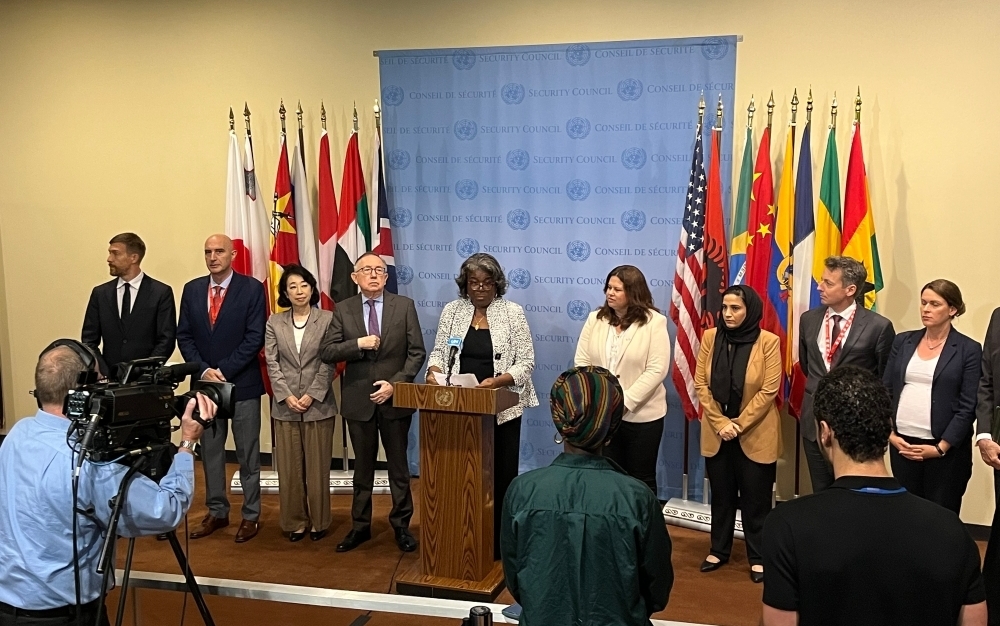テロに関する安保理ブリーフィングに際した女性・平和・安全保障共同コミットメント参加国による共同プレスステークアウト
令和5年8月25日

We, the Security Council signatories of the Statement of Shared Commitments for the principles of Women, Peace and Security (WPS), Albania, Brazil, Ecuador, France, Gabon, Japan, Malta, Switzerland, the United Arab Emirates, the United Kingdom, and the United States have come together to express grave concern regarding the use of Sexual and Gender-Based Violence (SGBV) as a strategy and tactic by terrorist groups, such as Da’esh. We underscore conflict-related sexual violence can constitute a violation of international law.
As we heard today from the civil society briefer, who courageously shared her personal story of survival from conflict-related sexual violence, groups committing terrorist acts are using SGBV as a political tool and a tactic of terrorism, disproportionately affecting women and girls, and undermining human rights. This gruesome dehumanizing tactic is rooted in misogynistic ideologies and part of a strategy used by terrorist groups to fuel instability, fracture and control communities, support terrorist financing and recruitment.
We know these acts of violence disproportionately impact women and girls. Terrorist groups target women civil society leaders, women peacebuilders and human rights defenders with SGBV, including online, to stifle their advocacy and curtail their participation in peace and security processes.
And too many perpetrators of sexual and gender-based violence are not held to account – a prominent issue in the recent Arria-formula meeting of the Council on “Enhancing the capacities of Member States to ensure a gender-responsive approach to counter-terrorism.”
Across the international system, we must continue to act -- and with urgency.
We encourage the Counter-Terrorism Committee Executive Directorate (CTED) to continue its important work integrating gender as a cross-cutting issue, holding consultations with women and women's organizations, and advancing gender-sensitive research. We commend CTED’s ongoing work on SGBV in terrorist contexts and we welcome the establishment of the Human Rights and Gender Section of the UN Office of Counter-Terrorism (UNOCT), which is working to effectively counter the instrumentalization of gender by terrorist groups and support the elimination of sexual violence as a terrorist tactic.
And we highlight the renewed emphasis in the eighth review of the UN Global Counter-Terrorism Strategy (GCTS) on a thorough gender analysis for the prevention of terrorism and the important role women-led civil society organizations play in countering terrorism. Let’s be clear: when we empower women and apply gender-responsive approaches, we help advance international peace and security.
As Council members, we will stand together with the survivors of sexual and gender-based violence, and reaffirm our commitment to prioritize their rights and needs – as a moral and humanitarian imperative, and as a pressing matter of international peace and security.
Conflict in Sudan
Today we as the WPS-shared commitment signatories also come together to express our grave concern regarding the continued reports of gender-based violence, including Conflict-Related Sexual Violence (CRSV) in Sudan’s conflict.
Following the outbreak of conflict in April, multiple entities have reported systematic and widespread use of sexual and gender-based violence, including rape, kidnapping, sexual exploitation and other forms of SGBV, especially in Darfur but also in other areas of Sudan, including Khartoum. Women and girls are facing violence and harassment as they flee from one state to another. Homes have been looted, and reports of domestic violence are on the rise.
We strongly condemn the use of SGBV and call for the immediate cessation of violence against civilians.
We call on all parties to the conflict to end any violations of international humanitarian law and international human rights law, including those involving sexual violence.
We echo High Commissioner Turk’s statement this past week: perpetrators must be held accountable.
And we continue to reiterate the need for the parties to immediately cease hostilities, facilitate humanitarian access, and establish a permanent ceasefire arrangement.
